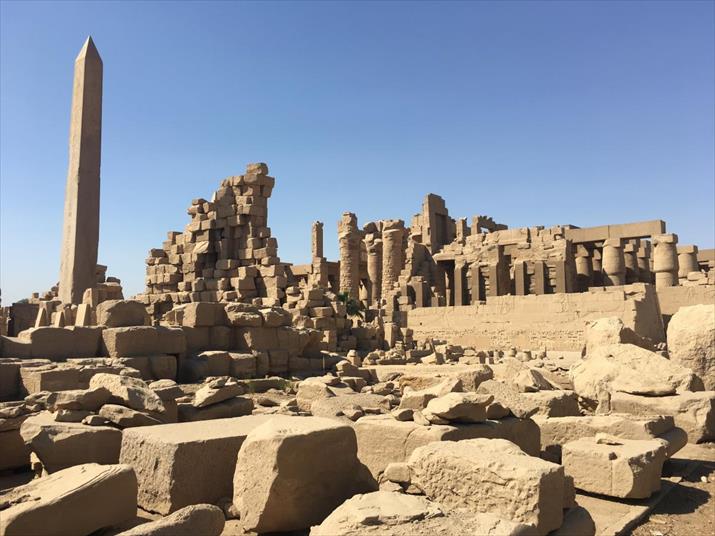| Lifestyle |
| Breaking New Ground | |
| The first Sino-Egyptian joint archaeological dig marks a milestone in Chinese archaeology's overseas cooperation | |
|
|
 A picture of the Karnak Temple Complex (File)
For Gao Wei, breaking ground is nothing new. As a Chinese archaeologist, he has taken part in countless digs throughout the country. But when the first Chinese shovel hits the dirt in Egypt, as expected in October this year, it takes on special significance, both for him and for Chinese archaeology. "Opportunities such as this one to collaborate with foreign archaeologists are especially hard to come by. Even though I am an Egyptologist by training, [until now] I never had the chance to work in Egypt, so the team members and I are very excited about our first cooperation project in Egypt," he told Beijing Review. Gao is a member of the Chinese archaeological team that will take part in the first Sino-Egyptian joint excavation project. Working side by side with Egyptian colleagues, he will be among the first Chinese archaeologists to help uncover the hidden secrets of the ancient Pharaonic capital of Thebes, located in south Egypt's Luxor. "For us, the most important thing is to be able to touch the relics with our hands. Although we have plenty of documents to help us understand Egypt's rich heritage, for archaeologists, nothing can replace being on the ground, taking in the atmosphere of the site, and feeling with our own hands a genuine piece of Egypt's history," said Gao. Long-time coming There are around 250 international archaeological missions in Egypt, including 11 in Luxor alone, according to Egypt's Ministry of Antiquities. But until now, none came from China. "This convinced us that international exchange is a pressing task that needs to be fulfilled for the benefit of Chinese archaeology," said Wang Wei, Director of the Research Center for Chinese Archaeology Abroad, an affiliate of the Institute of Archaeology at the Chinese Academy of Social Sciences. "We now have the ability to go out and help others with funds, technology and skills. We have entered an era of going out into the world." The center aims at improving the role and position of China in the global archaeological field, and facilitating exchange with foreign counterparts. Already, the Institute of Archaeology has started sending its best experts to take part in joint digs in a dozen countries, including India, Honduras and Kenya. "This is a good thing for Chinese archaeology because we can observe our peers and compare ourselves, and this greatly improves our know-how. It's a very rewarding experience," said Gao. Whenever they go, Chinese archaeologists are most welcomed by local partners, not least for the expertise and technologies they bring with them. In 2010, a team of 11 Chinese archaeologists went to Kenya to search for an ancient shipwreck of Ming Dynasty (1368-1644) maritime explorer Zheng He. The team was later praised by the Kenyan Government for having improved the country's underwater surveying techniques. "The Chinese experts are highly skilled professionals who brought their expertise in underwater archaeological excavations as well as special skills in the identification of Chinese ceramics," Kiriama Herman, a Kenyan archaeologist who took part in the joint Sino-Kenyan digs, told Beijing Review. High expectations Egyptian counterparts have similar expectations for the coming joint dig, which will take place in the Precinct of Montu, a part of the Karnak Temple Complex. "China has the latest advanced technology in the discovery of monuments and excavations and experience in how to deal with these treasures, including restoration, exhibition and protection of monuments and heritage," Mohamed Hassan Abdel Fattah, Director of Archaeological Documentation at Egypt's Ministry of Antiquities, told Beijing Review. He said cooperation between the two ancient civilizations could mean a "big bang" in the field of archaeology, adding that 3D remote sensing and imaging and radar technologies could be put into use to uncover hidden royal tombs. "What delighted us is that Egypt's Ministry of Antiquities has a very open attitude to the application of new techniques, and they welcome different working methods of different countries. Our techniques have proved to be effective for Chinese archaeology, and we shall see if they will give similar results in Egypt," said Gao. Although China is a latecomer to Egyptology, the archaeological team members expressed confidence in their ability to up their game in this field and contribute to the exploration of Luxor. "Our focus is, first and foremost, on learning because we believe that we can all learn a lot from our cooperation. For example, for environmental reasons, Egyptian archaeologists have a better understanding of stones, while the Chinese team has stronger expertise in soil tones," explained Gao. He and his colleagues have done their homework to prepare themselves for this journey, including collecting data about the site where they will work. Moreover, the Institute of Archaeology invited world-renowned experts to give the team a series of 13 lectures on ancient Egyptian civilization. Cooperation in the digging pits can open up new channels for broader relations between the two countries' archaeologists, said Fattah. Archaeology is not only about revealing mysteries of the past, but also about educating the public, he told Beijing Review, adding that more attention should be given to cooperation in the fields of museology, culture and education. This is in line with the mission of Gao and other Egyptian archaeologists in Egypt, whose objective, said Wang Wei, is "not only to decipher Egyptian civilization, but also to contribute their wisdom to unraveling the mysteries that remain unresolved in the study of world civilization." (Reporting from Luxor, Egypt) Copyedited by Chris Surtees Comments to yulintao@bjreview.com |
|
||||||||||||||||||||||||||||
|